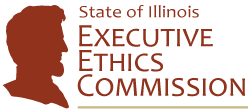Possible online services disruption due to Internet related outage
Frequently Asked Questions
- 1. How can I contact the Executive Ethics Commission?
- 2. Does the Executive Ethics Commission have jurisdiction over all State employees?
- 3. Should I report misconduct by a State employee to the Executive Ethics Commission?
- 4. As a State employee, I have a question about whether certain conduct is ethical. Can I ask the EEC?
- 5. Who must take the annual ethics training?
- 6. My supervisor came to my desk and asked me to purchase tickets to a political fundraiser. Can she do this?
- 7. Are other kinds of political activities prohibited during working hours?
- 8. Can I do campaign work for a party or candidate on my own time?
- 9. Can I make campaign phone calls from my desk during the lunch hour?
- 10. What is an ex parte communication?
- 11. What is a "material argument"?
- 12. Can you give some examples of ex parte communications?
- 13. What should I do if I receive an ex parte communication?
Executive Ethics Commission
401 S. Spring
513 William Stratton Building
Springfield, Illinois 62706
Voice: (217) 558-1393
Fax: (217) 558-1399
EEC@illinois.gov
No. The EEC's jurisdiction extends only to employees and officers of the executive branch of the State of Illinois. Employees of the legislative branch of the State of Illinois are under the jurisdiction of the Legislative Ethics Commission.
You may report suspected misconduct to the EEC. The EEC is not permitted to investigate these allegations on its own, since it might have to act in a deciding role whether resulting charges have been sustained. However, the EEC will forward any complaint it receives to the appropriate Executive Inspector General for further action.
Your agency ethics officer is specifically authorized to provide guidance to officers and employees in the interpretation and implementation of the Ethics Act. 5 ILCS 430/20-23. Therefore, questions concerning the Act ought to be directed to him or her.
All State of Illinois employees, including full-time, part-time and contractual employees and appointees, are required to complete annual ethics training. These trainings are administered by the Executive Inspectors General with oversight by the Commission.
No. Political contributions may not be solicited, accepted or offered on State property.
During working hours, employees may not plan or participate in political events and may not assist in political campaigns by polling, soliciting votes, preparing or circulating petitions, distributing campaign literature or assisting at the polls on behalf of any candidate or political organization. For a complete list of prohibited political activities, you should consult your ethics officer.
Yes. State employees may voluntarily engage in otherwise appropriate political activities during periods when they are not being compensated by the State. These periods include after hours or while on vacation, personal or compensated time.
No. Employees must not intentionally misappropriate State property or resources (e.g. desk, telephone) by engaging in prohibited political activity.
For all agencies, an ex parte communication means any written or oral communication by any person during the rulemaking period that imparts or requests material information or makes a material argument regarding potential action concerning an agency's general, emergency, or peremptory rulemaking under this Act and that is communicated to that agency, the head of that agency, or any other employee of that agency.
For certain specific agencies, an ex parte communication is a written or oral communication that imparts or requests material information or makes a material argument regarding potential action concerning regulatory, quasi-adjudicatory, investment or licensing matters pending before or under consideration by the agency. It does not include statements made in a public forum, statements regarding matters of procedure or practice, and statements made by State employees to other employees of that agency.
A material argument is one that a reasonable person would believe was intended to influence the agency's decision. A question or statement about a matter of practice or procedure is not a material argument.
If an elected official calls and argues that his constituent should have her insurance producer's license reinstated while that issue is pending, the official has made an ex parte communication. If a lobbyist calls or writes a letter to an agency in which he insists that a utility be given a variance while that issue is pending before the agency, the lobbyist has made an ex parte communication. If any person contacts the agency concerning agency rules pending with the Joint Committee on Administrative Rules (JCAR) and argues that the proposed rules need to be amended, that person has made an ex parte communication.
You should report this to your ethics officer immediately. Your ethics officer may ask you to complete a form that provides some details related to the communication.

